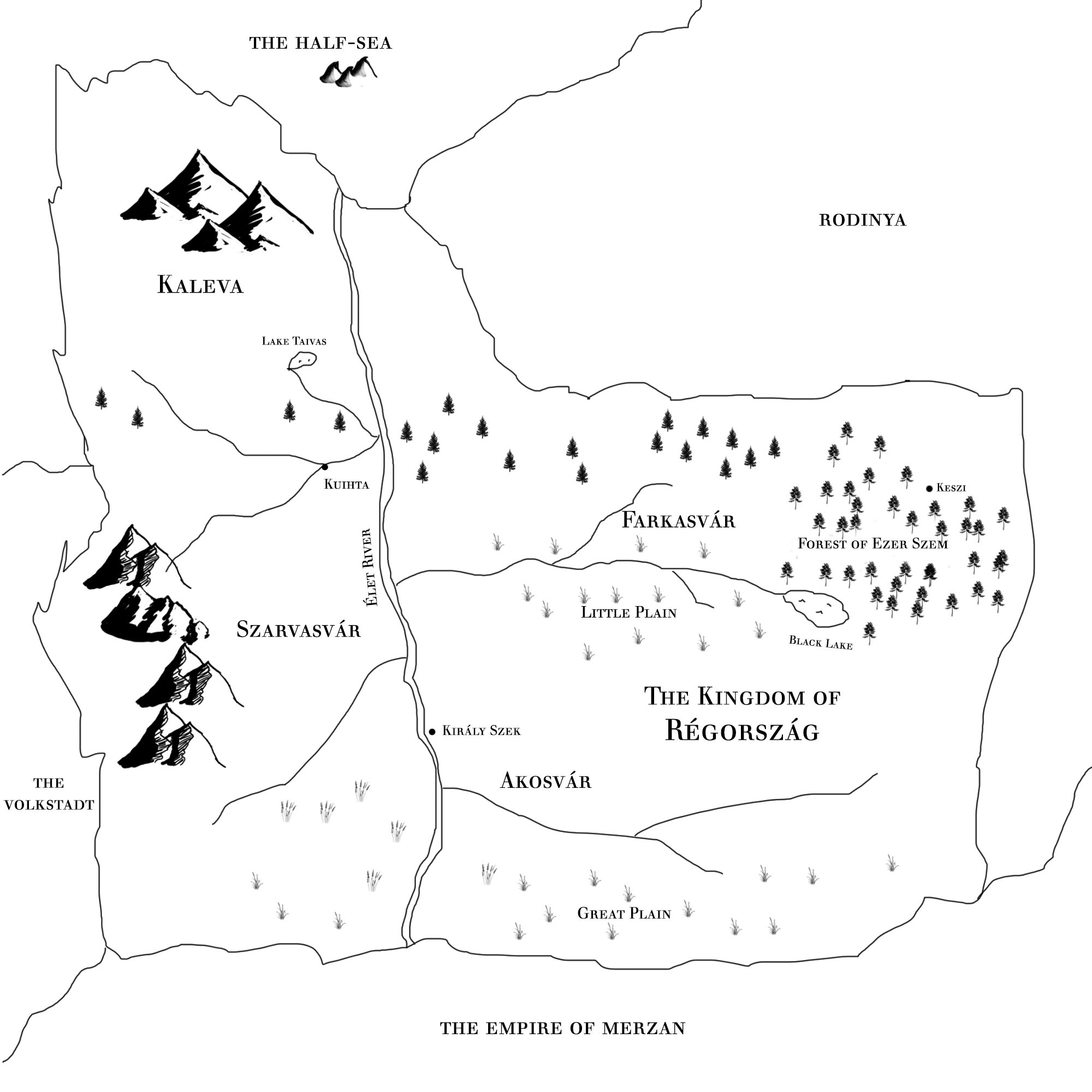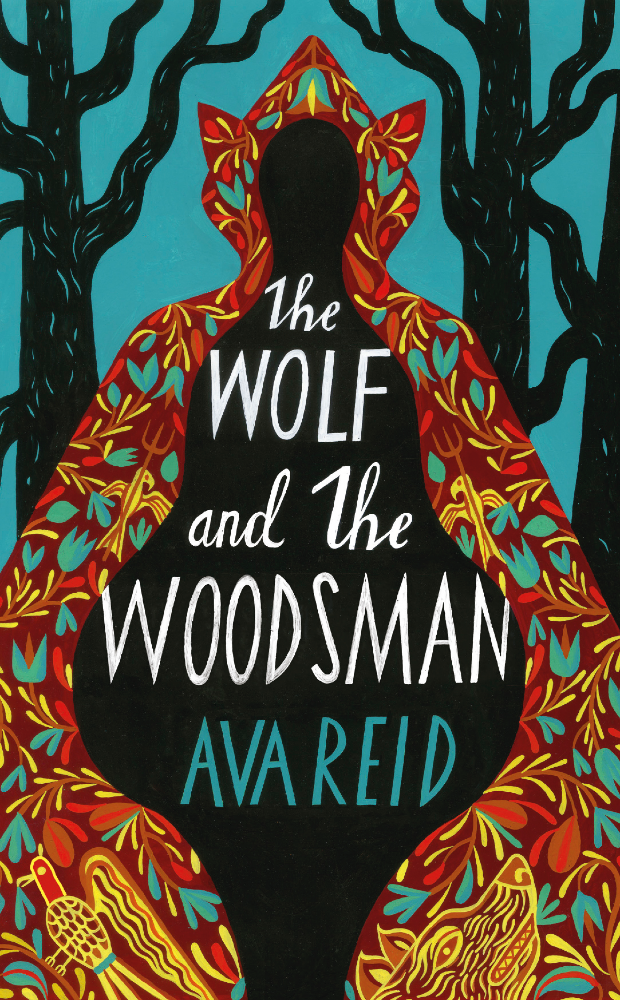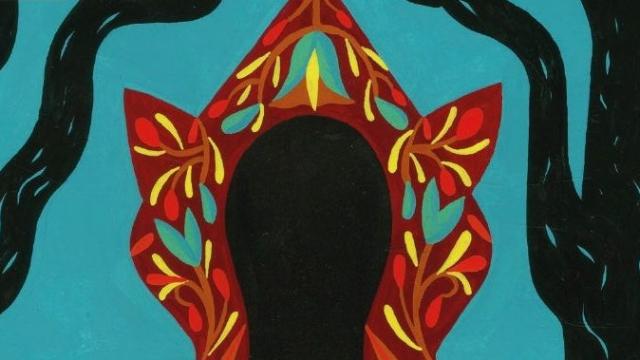In Ava Reid’s The Wolf and the Woodsman, a young woman named Évike becomes an outcast in her village because she doesn’t have magic powers (at least, none that she knows of). She’s sent away as a sacrifice, but her fate changes dramatically after she survives a monster attack. Today, Gizmodo has more from Reid’s debut novel to share!
According to publisher Harper Voyager, The Wolf and the Woodsman is “inspired by Hungarian history and Jewish mythology” and “follows a young pagan woman with hidden powers and a one-eyed captain of the Woodsmen as they form an unlikely alliance to thwart a tyrant.” As readers soon learn, that particular Woodsman is also hiding some secrets: namely, he’s “he’s the disgraced prince whose father needs pagan magic to consolidate his power.” So you can see how this pairing might bring up some tension at first — but eventually, some common ground too. Below, we’ve got an exclusive look at a map showing the land that backgrounds Reid’s tale, as well as the full cover and another exclusive: an excerpt from The Wolf and the Woodsman.

Here’s the full cover, designed by Russell Cobb.

Here’s the excerpt that’ll introduce you to main character Évike; it’s taken from the second half of the book’s first chapter, as she’s being prepped to deceive the Woodsmen who’ll soon arrive to escort her to her doom.
Something — a laugh or a scream — burns a hole in the cavern of my throat. Katalin is frozen like the trees we tied down, helplessly rooted in place, her mouth hanging slightly ajar. I don’t think the realisation has hit her yet. She’s trapped in that cold, arrested moment before she feels the blade between her shoulders.
But Virág isn’t frozen. She gets to her feet, even as she trembles with the ebbing of her vision. Whatever she saw still shudders through her, but the lines of her face are carved deep with determination. She paces the floor of her hut, from the moss clotted in the doorway to the flickering hearth, her eyes trained on something in the middle distance. When her gaze finally snaps back to Katalin and me, she says, “Take off your cloak.”
I glance down at my own woolen cloak, brow furrowing.
But Virág isn’t looking at me.
“My cloak?” Katalin clutches the collar of it, right near the curve of the wolf’s open mouth, suspended in an immortal howl.
“Yes. And go fetch a forger.”
Virág is already rifling through the salves and tonics on the shelf. With a flustered nod, Katalin hurries out of the hut, leaving her beautiful white cloak pooling on the dirt floor. The sight of it jolts me from my stupor; I snatch it up and hold it up to my cheek, but it feels wrong, as empty and bodiless as a ghost. My mouth tastes like metal.
“Virág, what are you going to do?”
“The Woodsmen want a seer,” she says, without looking up. “Keszi cannot spare one.”
I don’t have time to wonder at her words. Katalin bursts through the threshold again, Zsófia behind her. When she sees me — holding the wolf cloak too — she sucks in a haughty breath, pinched nose flaring. I want to believe that Katalin brought Zsófia just to spite me, but she really is one of the best forgers in the village.
“You must have known it all along,” Katalin says wretchedly. “You must have known they wanted a seer.”
“I suspected,” Virág admits. “But I couldn’t know with certainty. I also thought they might perish on their route. I thought perhaps the king would change his mind. But a vision is a vision. Now we don’t have much time.”
I open my mouth to say something, anything, but Virág’s fingers jerk roughly through my hair, smoothing the knots and tangles. I let out a feeble noise of protest. There’s a slow panic seeping into my belly.
Virág uncaps a small vial and pours its contents into her hands. It looks like white dust and smells sickly sweet. She works the mixture into my hair as if she were kneading dough for fried flatbread.
“Powdered asphodel,” she says. “It will turn your hair white.”
“Surely you don’t expect the Woodsmen to be deceived by a bit of dye,” Zsófia scoffs.
My stomach twists, sharp as a knife. “Virág . . .”
She doesn’t say anything. She doesn’t look at me. She turns to Zsófia, instead.
“The Woodsmen are not expecting Katalin,” she says. “They are merely expecting a seer. Still, you will need to forge some silver.”
With an enormous, persecuted sigh, Zsófia leans over and begins to sing — too quietly for me to make out the words, but I know the tune at once. It’s the song of Vilmötten. Before doing his great deeds and making deals with gods, Vilmötten was a bard, wandering from town to town with his kantele strapped to his back, hoping to make enough coin for bread and wine. That was the part of the story I liked the best — the part where the hero was just a man.
It’s the same song that my mother used to sing to me, cocooned in the safety of our shared hut while thunder and lightning skimmed across the black summer sky. Before I became Virág’s reluctant ward.
Before the Woodsmen took my mother from me.
I’ve only felt fear like this once. It comes back to me in flashes, the memories I’ve buried down deep. My mother’s hand, slipping from mine. The dull gleam of her grey cloak as she vanished into the woods. The lock of hair she’d pressed into my palm, mere moments before she left me for good.
I try to cry out, but the sound gets strangled somewhere in my chest, and comes out a half-formed sob.
I don’t care that I’m weeping in front of Katalin and Zsófia. I don’t care that Virág might lash me for it; I don’t care that this is precise, damning proof of what a coward I really am. All I can see is my mother’s face, bleary in my fifteen- year-old memory, fading, fading, fading.
Virág grabs hold of my chin. Through the rheum of tears her mouth is set, her eyes hard.
“Listen to me,” she snarls. “We all must do what we can to keep the tribe alive. We cannot allow the king to have the power of a seer. Do you understand?”
“No,” I manage, my throat beginning to close. “I don’t understand why you want to march me to my death.”
Virág lets go of me with a sharp breath, defeated. But the next moment, she’s thrusting a small piece of polished metal toward me. I stare at my own face within it, slightly warped by the curves of the forged mirror. Katalin’s face hovers behind my own, two polar stars in the darkness of the hut, our hair gleaming like new frost. Mine is not quite white — more of a dingy grey, sooty as liquid steel.
Perhaps it’s close enough to swindle a Woodsman, but that’s where the similarities end. I’m short and thick-limbed, while Katalin is willow-tree tall, her narrow shoulders shooting up like a proud, thin trunk all long fingers and delicate wrist bones. Her skin has a milky translucence, the blue veins faintly visible, like a webbed leaf shot through with sunlight. My hair is — was — a reddish brown, as if my mother’s russet mane had been wrung out like water and sieved down to me, my eyes a murky green, my mouth small and scowling. My nose and cheeks are perpetually pink, and there’s a grid of whiskery scars across my chin from running face-first into a thicket.
I expect to see her preening, glowing. But Katalin’s lovely face looks as horror-struck as mine. In this moment only, we are perfect mirror images of each other.
Charlatan, I want to say. An hour ago you wished I would be taken.
I reach down to touch the braid in my left pocket, but it brings me no comfort this time.
“Évike.” It’s Katalin’s voice, small and hushed like I’ve never heard it before. I watch her in the mirror, but I don’t turn around. “I didn’t mean — ”
“You did mean it,” I say, my jaw clenched. “Or else you’re a liar. What’s worse, a liar or a monster?”
She doesn’t answer. I expect Virág to reprimand me again, but even she is silent now too. Zsófia’s singing has trailed off, the last note of the melody still yet to be hummed. In the quiet space left by her unfinished song, I hear it — the sound of hooves on the ground.
The villagers are gathered into neat rows, backs straight and chins held high as they stare into the mouth of the woods. Women and girls in front, men and boys behind. All blades are sheathed, all arrows held flush in their quivers. The mosquito-flecked evening settles over us like thick linen. Virág leads me through the very centre of the crowd, parting the girls in their pristine cloaks. The women and girls all have two faces — the wolf’s and their own. Their human faces are schooled into masks, stoic and silent, and even the youngest know well not to shiver. But as I pass between them, their lips purse and their eyes widen. Boróka lets out a tiny gasp, and then claps her hand over her mouth. I can hardly bear to look at her.
And then I can only look at the Woodsmen.
They step forward, through our cowed and impotent trees. Four of them, on obsidian horses, each mount’s breast branded with the seal of their holy order. Each Woodsman wears a dolman of finely embroidered silk, and over it, a black suba, the same shaggy woolen cloak favoured by herders on the Little Plain. It almost makes me want to laugh, to think of the Woodsmen as humble shepherds. They carry no swords, but there are great steel axes hanging at their hips, so heavy it seems a miracle that they don’t topple sideways off their horses.
How did my mother feel, when she saw the horrible glint of those axes?
Three of the Woodsmen have close-cropped hair, mangled scalps visible beneath the tufts that grew back scraggly and uneven. As boys, they grow their hair out long, and then cut it on their eighteenth name days, the same day that the king puts the axes in their hands. They burn all their long hair in a bonfire, sparks and awful smell shooting up into the night sky. It’s their sacrifice to the Prinkepatrios, and in return, he promises to answer their prayers.
But real power requires more than hair. My gaze travels to the fourth Woodsman, whose hair is longer, curling in dark ringlets against the nape of his neck. A leather patch is drawn over his left eye. Or the hole where his eye should be.
Only the most dedicated and pious boys part with more than their hair. An eye, an ear, a pink sliver of tongue. Their littlest fingers or the tips of their noses. By the time they’re men, many of them are missing tiny pieces.
Every muscle in my body is coiled like a cold snake, tensed with a thousand unmade decisions. I could run. I could scream. I could stammer out the truth to the Woodsmen.
But I can imagine what would happen if I did: those axes swinging through the crowd, slicing through flesh like shears through silk, bone crumbling into pith. Blood dyeing our wolf cloaks red. I remember that my mother went in silence, without tears in her gaze.
I touch her braid in the left pocket of my trousers, the gold coin in my right. I had just enough time to take them before Katalin swapped her cloak for mine.
The one-eyed Woodsman leans close to his compatriot. I can scarcely hear the words he speaks, but they sound some- thing like: “Bring her.”
“Igen, kapitány.”
For all my newfound bluster, my heart is still pounding a frantic beat. I lean close to Virág, my voice a low, furious whisper. “This won’t work. They’ll figure out I’m not a seer. And then they’ll come back for Katalin, or worse.”
“The journey to the capital takes half a moon at best,” Virág says, oddly serene. “Enough time for visions to change.” Her words hurt worse than a thousand lashes. I want to ask why she bothered raising me after my mother was taken, only to throw me up as a shield against the Woodsmen at the first opportunity. But I can’t say any of that with the Woodsman approaching. And then it occurs to me, terribly, that perhaps I’ve answered my own question: I was raised like a goose for the slaughter, just in case this moment ever came.
The Woodsman stops his horse mere inches from where I stand and looks down, eyes passing over me as if I were a piece of livestock fettered for auction. “Is this the young seer?”
“Yes,” Virág says. “Five and twenty years old and already half as skilled as me.”
My cheeks flush. The Woodsman glances back at his captain, who gives one swift, curt nod. Of course he wouldn’t ask her to prove it; only a fool would try to cheat the Woodsmen. Then he says, “Get her a mount.”
Virág grabs hold of the nearest girl, a young healer named Anikó, and gives her a hushed command. Anikó slips through the row of villagers and disappears. When she emerges a moment later, she’s leading a white mare behind her.
The Woodsman slides off his own horse. From the satchel on his hip, he produces a small length of rope. It takes me a moment to realise that he means to bind my hands.
Were my mother’s hands bound, when they took her? I can’t remember. I’m shaking like a sapling in a winter storm.
The Woodsman bends over slightly as he binds me, and from this vantage point, I’m struck by how young he looks, younger even than me. Not more than twenty and the king has already made him a monster.
When he’s finished, he takes the mare’s lead from Anikó and draws the horse over to me. It’s clear that I’m supposed to mount her, but my hands are tied and my knees feel too weak to support my weight.
“Get up, then,” the captain says, sensing my hesitation.
My gaze sweeps across the clearing until I meet his eye. It’s as black and cold as a new-moon night.
I’m stunned by how quickly the fear floods out of me, leaving only loathing in its wake. I hate him so much that my breath catches. I hate him more than Katalin, more than Virág, more than I ever hated the fuzzy idea of a Woodsman, just a dark shape in my worst dreams. Even though I know he’s not nearly old enough to have done it, I hate him for taking my mother away from me.
None of the villagers move as I scramble clumsily onto the mare’s back, trembling as if I’ve been wracked by a vision myself. I can’t help but scan the crowd, searching for tearful eyes or grieving mouths, but I only see their impassive masks, pale and blank. Boróka alone looks like she might weep, but her palm is pressed over her lips, fingernails carving bloody crescent moons into the skin of her cheek.
I’ve long given up on any of them loving me, but I still ache at how easy it is for them to hand me over. I’m a good hunter, one of the best in the village, even if I can’t forge my own arrowheads. I spent years doing Virág’s drudgery, even if I muttered curses the whole time, and I killed and cleaned half the food on their feast tables.
None of it matters. Without a lick of magic to my name, the only thing I’m good for is a sacrifice.
Now mounted on the mare’s back, I grip the reins with numbing fingers. Zsófia styled a section of my hair, grudgingly, into a dozen tiny, intricate braids as thin as fishbones, while the rest hangs down my back, newly white. The wolf cloak sweeps over my shoulder, and I remember all the times I yearned to have one of my own. It feels like Isten playing his cruelest joke.
“Come on,” the captain says, voice sharp.
And that’s the end of their visit. They come, they take, they leave. Our village has paid its tax — a cruel, human tax — and that’s all the Woodsmen want. The cold brevity of it all makes me hate them even more.
My horse trots forward to join the Woodsmen where they stand at the edge of the woods. Their long shadows lap at our village like dark water. As I approach, I hear a fluttering of leaves, a whisper on the wind that sounds almost like my name. More likely it’s my wishful imagination, hoping for even a word I could believe was a farewell. The trees do speak, but in a language we all stopped understanding long ago, a language even older than Old Régyar.
I meet the captain’s pitiless gaze. I don’t look back as my horse crosses the threshold from Keszi into Ezer Szem, but the trees shift behind me, knitting together into a lacework of spindly branches and thorn-limned vines, as if the woods have swallowed me whole.
Excerpt and illustration from Ava Reid’s The Wolf and the Woodsman reprinted by permission. Copyright Harper Voyager.
The Wolf and the Woodsman by Ava Reid arrives June 8; you can pre-order a copy here.
